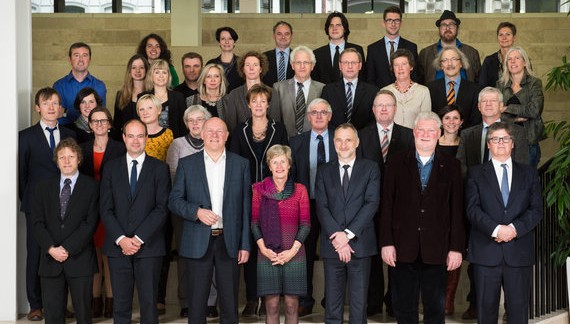
Ensuring a gender-balanced representation in the highest decision-making body of Ghent University
Since Ghent University was founded, the composition of the university’s Board of Governors (Raad van Bestuur) has been traditionally male-dominated. This Board is highest decision-making body of the university. In order to ensure a gender-balanced representation in the Board of Governors, in 2014, Ghent University changed its procedures for the election of the members of this Board. The current election procedures request a 40/60 % gender-balanced representation of its members. Faculties are required to have at least one male and one female candidate for the elections.
If the elections do not respect the minimum 40/60 gender balance, the candidate with the least votes from the overrepresented sex (compared to other faculties) will have to be replaced by the faculty’s candidate of the other sex with the highest number of votes. As soon as the new procedure was implemented for the first time (2014), it has instantly changed the university’s male-dominated board: gender balance was achieved for the first time in the university’s history.
EU policies and regional laws triggering change at institutional level
Belgium has specific laws and policies to improve gender equality in research institutions (research and decision-making) launched at the level of the Flemish and French Communities. Flemish legislation (2012) already issued a binding decree that stipulated that gender balance ranging from 1/3 to 2/3 had to be ensured in the universities’ decision-making and advisory bodies these are expert commissions, boards or steering groups. As this legislation did not apply to private universities, they have spontaneously adopted internal rules in line with this legislation.
In response to this decree, Ghent University changed its election procedures for such bodies. For the election of its highest decision-making body, the Board of Governors (Raad van Bestuur), the university decided to go beyond the legal minimum proportion. Instead of proposing a 1/3 share of the underrepresented sex, the new institutional election procedures established a gender-balanced target ranging from 2/5 to 3/5 (or 40/60 %). The rationale behind this decision was that Ghent University wanted to anticipate the European Directive that stipulates a gender balance of minimum 60/40 for the boards of directors of companies and public institutions by 2017.
The new election procedure
In the new procedure, faculties are required to have at least one male and one female candidate for the elections. If the elections have an unbalanced gender outcome (not respecting the minimum 40/60 gender balance) the candidate with the least votes from the overrepresented sex (compared to other faculties) has to give way to the faculty’s candidate of the other sex with the highest number of votes.
It is interesting to note that Ghent University did not opt for a ‘duo’ election system in which a male and a female candidate are elected as a team. This was actually requested by opponents of the current system as the duo-system leads to a formal compliance but informally perpetuates inequality. Although the duo-system often results in duos where the female candidate is the official candidate and the male candidate is the official ad interim candidate, the male candidate is seating in practice.
From a male-dominated to a gender-balanced Board of Governors
The composition of the university’s Board of Governors has been traditionally male-dominated since the university was founded. Over the years, the increasing number of female professors at the university did not change the male composition and decision-making culture. For instance, before the Flemish law entered into force and the new procedure was instituted, it was a common informal practice to appoint the resigning dean of a faculty to be seated in the Board of Governors. Before the new procedure was installed, the number of female professors in this Board varied from zero to two out of 12 professor positions (or 0 to 16 %).
Main obstacles and results
After its institutionalisation, 8 out of 11 faculties supported the new procedure. Three faculties boycotted the ‘undemocratic procedure’ by making pre-agreements as regards who to vote for. Despite such incidents, the elections represented a significant success and meant a historic shift for gender equality at Ghent University.
As a result of the 2014 election, the Board has now a 50/50 composition. No female representative had to be positively discriminated. To the contrary, to reach the 40 per cent minimum, one woman had to give way to her male counterpart although she had more votes in total. Furthermore, the reformed election has attracted the most voters ever in the history of the University (9,268 votes).Other actions promoting gender equality in Ghent University
Ghent University is showing a wider commitment to establishing a gender policy through its gender actions 2012. The current rector and her team are supporting this initiative. Likewise, the gender policy officer is putting efforts in gender-sensitising the faculties. These seem to be important pre-conditions supporting the outcomes of the new elections procedure.
Contacts
Dr. Tine Brouckaert
Policy Officer Gender UGent | Ghent University
St. Pietersnieuwstraat 33, 9000 Gent, Belgium
Stephanie Lenoir
Public Relations Manager Ugent | Ghent University
St. Pietersnieuwstraat 33, 9000 Gent, Belgium
Further information
More on good practices
Downloads
-
The new election procedure
- Language
- EN
- File type and size
- PDF, 289.08 KB